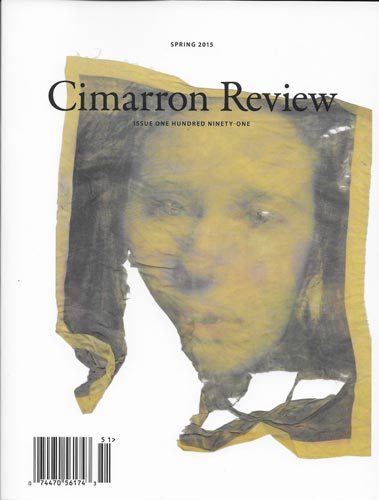Cimarron Review – Spring 2015
Cimarron Review touts that they’re “one of the oldest quarterlies in the nation,” with a founding year of 1967. The Spring 2015 issue demonstrates why they’ve been around so long, with compelling poetry and fiction spread across 104 pages, sure to win over new readers and keep subscribers around. Cimarron Review touts that they’re “one of the oldest quarterlies in the nation,” with a founding year of 1967. The Spring 2015 issue demonstrates why they’ve been around so long, with compelling poetry and fiction spread across 104 pages, sure to win over new readers and keep subscribers around.
“Conch Tongue” by Dustin M. Hoffman opens the issue. The story’s narrator, a tour guide at a Jamaican resort, “one of the few dark-skinned workers the American’s don’t fear,” has been assigned “big-deal guests,” the Trumans. If all goes well, her boss promises her home will be fixed up, leading her to grapple with the price of dignity:
After the zip-line, the Trumans push dollars into the workers’ palms. They swarm to unlatch the Trumans’ lanyards, offer hands to guide them over rocks and back to the car. I hold the door open and the Trumans try to push money at me. I pretend I don’t see, don’t say anything, but Mr. Truman stands there smiling until I take his bills.
Hoffman brings all his characters to boisterous life, from seedy Alton, who sells his wares to unsuspecting tourists in the neutral ground of the sea, to the Trumans themselves, all seen through the eyes of an honest narrator. The editors chose well placing this piece first—I was hooked.
In “Do the October Dangle,” Matthew Pitt weaves an even more gripping story. What becomes a tale of revenge is presented from the voice of a bawdy diner waitress, confessing to “you,” an unnamed patron. After being outed as a squatter by “one of the rich kids who infested our town,” her pride and joy—her self-made and –run haunted house—is closed down. What better way to get even with those rich kids than by teaming up with Harrison, the local driver’s ed teacher to create the ultimate test course, complete with fake projectile brains and bloody cow bladders? It’s soon revealed that Harrison has his own plans for revenge and what could’ve almost been the plot of a dark comedy film quickly comes to a sobering end. Pitt’s narrator carries the story along so flawlessly and with a voice distinctly hers, I could clearly imagine her leaning on a greasy countertop, refilling my coffee while she shared her story.
Audrey Ferber’s “Retreat” and Catherine Brady’s “The Ineptitudes,” the other two pieces of fiction in this issue, are also great reads, but there’s plenty of poetry to sink into in this issue too. Rachel Morgenstern-Clarren’s “The Summer We Moved West” is a perfect piece to read this time of year with lines like “The city swelled with cicadas—” and:
The fan churned heat
around our dewed limbs.
In those hours, rain
was what I thought I wanted.
Other pieces of poetry in this issue complemented each other well. Three that come to mind are “Bed Rest” by Heather Kim Lanier, whose speaker grows life inside her while the world outside is questionable and unknown and whose father’s death is contrasted with her unborn baby’s life; “Dear Sir” by Katherine Linton whose speaker speculates about her daughters’ eyelashes and the shapes of their hands; and “Interim” by Christopher Robley, whose speaker is a marrow donor for his father. Life, death, sickness, and health are all present, leading me to not only connect the pieces to one another, but to also connect with the poetry on a personal level.
There’s plenty of other poetry to enjoy in this well-paced, well-organized issue. Each piece seems to have been chosen with the utmost care and thought. In production for almost 50 years, Cimarron Review has much to offer its readers, and I hope to see it around for many more years to come.
[www.cimarronreview.com]





